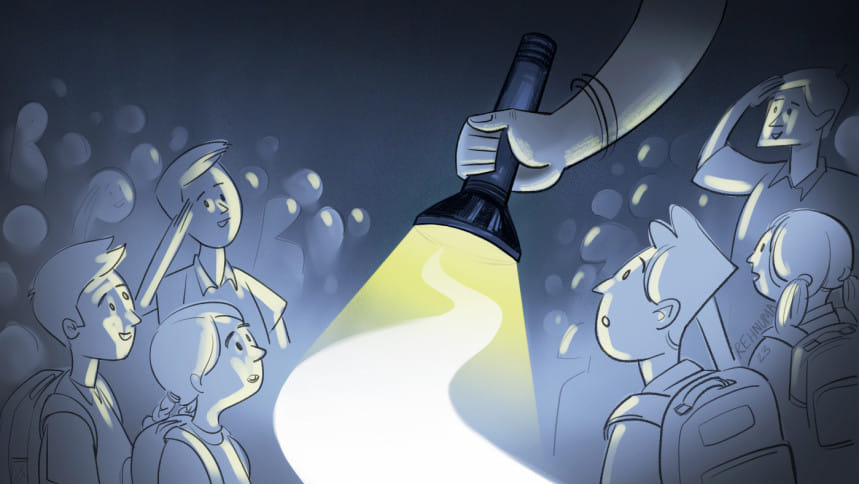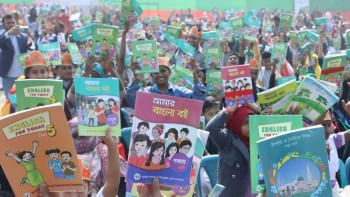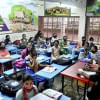A noble profession and the system that fails it

In Discipline and Punish (1975), French philosopher Michel Foucault argues, "Is it surprising that prisons resemble factories, schools, barracks, hospitals, which all resemble prisons?" The observation is part of a larger argument the thinker makes about the formation of disciplinary societies that are intent on producing subjects who are docile and capable of self-disciplining. But the comparison – between schools and prisons – permits us nonetheless to initiate a discourse on the politics of educational institutions in our country. If schools are indeed prisons, who are they imprisoning, and what practices structure such imprisonment?
Observed annually on October 5, World Teachers' Day, co-convened by the International Labour Organization (ILO), Unicef and Education International (EI), celebrates all teachers around the globe. This year's theme, "The teachers we need for the education we want: The global imperative to reverse the teacher shortage," brings attention to a crisis that is globally recognised. While Bangladesh's success in the education sector is laudable – nearly universal enrolment at the primary level, and near gender parity in education – without a doubt, the sector still faces significant challenges, especially with regards to providing quality education at all levels, failing to value our educators and truly empower our students.
On its face, demographically, Bangladesh is a largely homogeneous space. Yet, there are significant, irreconcilable differences in the ways in which education is delivered to our 169.8 million population. There are at least three mediums of instruction at work: Bangla, English, and the madrasa stream. Socioculturally, the medium of instruction is often the decider for where on the economic ladder an individual may end up. Managed and administered by two ministries at three levels (primary, secondary, and tertiary), the education sector faces inestimable challenges in providing quality education to its millions.
While a clear lack of structure in our diverse educational streams is one reason why the entire education ecosystem is suffering, a greater cause for why quality is further compromised is the deeply politicised nature of our institutions. When tertiary, and indeed sometimes secondary and primary, institutions remain more intent on making politically motivated decisions regarding the hiring, firing and promotion of teachers, and participating in corruption, mismanagement and misconduct, it is hard to remember that the primary goal of educational institutions is to educate the future of this country. The biggest issue, however, is budgetary. In the 2023-24 fiscal year, the proposed allocation of 1.76 percent of the GDP for the education ministries is not only the lowest in the past 15 years, but it is also the fifth-lowest among the education budgets of least developed countries, and significantly lower than Unesco's minimum recommendation of four to six percent.
More alarmingly, teachers are no longer the valued, moral arbiters of society that we once deemed them to be. A cursory look at the reports of violence against teachers, sometimes at the hands of their own students and other times by thugs and musclemen pampered by the powers that be, speak to the ethical and ideological decay we are experiencing as a nation.
While by no means arguing that all teachers deserve respect simply on account of being teachers, it is imperative to discuss the crisis facing education in the wake of rampant intolerance in Bangladesh, and how teachers have often been found on the frontline of that particular battle. The 2022 arrest and subsequent acquittal of Hriday Chandra Mondal for discussing the differences between science and religion in a classroom, for instance, make room for a conversation around a general hostility towards both freedom of thought and the ratio-centric ideals of knowledge itself. Furthermore, that providing basic materials, ensuring proper training, and affording necessary facilities to teachers is not the highest priority for a country intent on advancing in the digital world order is additional evidence to the ideological backseat that teachers' advancement has taken.
And yet, our educators themselves often demonstrate a significant lack of care towards their students. It is true that the absence of care or empathy can be attributed to the systemic lack of support for teachers – the sheer number of students and the sheer load of responsibilities imposed on an underpaid teacher in an understaffed and underfunded educational institution will surely lead to frustration on the teacher's part. Having said that, despite the limitations they face, the expectation remains: teachers ought to take greater care to provide support to their students.
When educators dole out corporal punishment without considering the impact such actions may have on the psychological development of students, when the endemic of student suicides after the often-public humiliation following board exam results go unchecked, and when teachers sexually harass students or partake in other criminal activities, it is hard to hope that the future generation of young minds will emerge as more humane and empathetic beings. How can they when, in their formative years, very little of those same qualities were extended to them?
The dignity and value of teaching as a profession must be restored through concentrated efforts made at the state, policy, institutional, and also personal levels. There is no alternative to weeding out the unfair elements within our education sector; from depoliticising the institutions to ensuring better recruitment methods, to providing proper training to teachers and ensuring support for students – the sector needs an overhaul, and urgently so. The recognition and appreciation that teachers deserve – and they do deserve it, given the Herculean task undertaken by those still standing, who are doing the grunt work with little compensation and appreciation – must be ensured if we are to ever recover from the losses incurred in our education sector over the last few decades.
Education is meant to free us. It is meant to teach us to be critical thinkers, compassionate individuals, and be better prepared to take on the challenges the world throws at us. This World Teachers' Day, our hope is for a system wherein teachers do not feel bound by its limitations and students do not feel imprisoned or feel uncared for. The only way forward is through change, and it needs to happen right away.
Dr Nazia Manzoor is assistant professor at the Department of English and Modern Languages of North South University (NSU).
Views expressed in this article are the author's own.
Follow The Daily Star Opinion on Facebook for the latest opinions, commentaries and analyses by experts and professionals. To contribute your article or letter to The Daily Star Opinion, see our guidelines for submission.


 For all latest news, follow The Daily Star's Google News channel.
For all latest news, follow The Daily Star's Google News channel. 












Comments